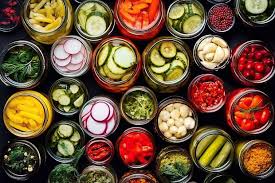Love Your Guts: Prebiotics and Probiotics – A Two-Part Series, Part 2: Probiotics
Have you ever heard of probiotics? Maybe you have noticed they have gained a lot of attention on social media. Maybe you are wondering what exactly are probiotics and how can they benefit you. These tiny, live microorganisms pack a lot of punch—they're essential microbes for your gastrointestinal (GI) tract. In a world where gut health is linked to everything from digestion to mood, understanding probiotics can empower you to take charge of your well-being. Follow along to learn more about probiotics and how you can incorporate them into your daily life!
What Are Probiotics? Breaking Down the Science
Probiotics are beneficial bacteria that maintain a healthy balance of gut flora, preventing harmful bacteria from taking over. Think of them as the good guys that help keep harmful bacteria regulated. By adding live and beneficial microbes to your gut, probiotics help strengthen your microbiota and can prevent dysbiosis, which is an imbalance in your gut’s microbiota.
Probiotics are, in fact, important as they all say and offer significant health benefits. Probiotics:
• Balance your gut microbiome and enhance digestion
• Suppress harmful bacteria
• Boost your immune system.
• Strengthen the intestinal barrier, reducing the risk of infections and digestive disorders.
Research has shown that dysbiosis can contribute to various health issues, including obesity, diabetes, and inflammatory bowel diseases (IBD). Probiotics can help restore balance by introducing beneficial bacteria that enhance the function of your GI tract and promoting overall health.
The Gut-Brain Connection
Did you know your gut and brain communicate? This relationship is known as the gut-brain axis. Interestingly, probiotics also play a role in the gut-brain axis. The system regulates gut functions and affects mental health. This can potentially improve your mood, giving your more energy while helping you feel more balanced and reduce stress and anxiety. Disruptions in this axis have also been linked to functional gastrointestinal disorders, such as irritable bowel syndrome (IBS). A healthy gut, is a happy you!
Probiotic Strains
Different strains of probiotics serve distinct roles in your body. Here are a few common ones:
• Lactobacillus species:
o L. acidophilus: Great for lactose digestion.
o L. rhamnosus: Supports gut health and may aid in weight management.
o L. casei: Boosts immune function.
o L. plantarum: Helps manage inflammation.
• Bifidobacterium species:
o B. longum: Promotes gut health and may reduce digestive discomfort.
o B. breve: Supports immune health and may help with allergies.
These strains play unique roles in enhancing gut health, and incorporating them into your diet can have numerous benefits, from digestion to immunity.
Ways to Incorporate Probiotics into Daily Diet
Adding probiotics to your daily diet is very simple. Here are some options to get you started:
1. Yogurt and Kefir: Start your day with a bowl of yogurt topped with fruits and nuts, or enjoy a refreshing glass of kefir. Both are packed with probiotics that your gut will love.
2. Fermented Vegetables: Add sauerkraut or kimchi as a side dish. Not only do they enhance meals with a tangy flavor, but they also provide a healthy dose of probiotics.
3. Miso Soup: This savory Japanese staple is not just comforting; it's rich in probiotics. Enjoy a warm bowl as a snack or anytime throughout your day.
4. Kombucha: This fizzy, fermented tea is a fun alternative to sugary sodas. Sip on kombucha for a refreshing probiotic boost throughout the day.
5. Pickles: Crunchy and delicious, pickles made from fermented brine (not vinegar) are a great snack that packs a probiotic punch.
6. Smoothies: Blend yogurt or kefir into your smoothies for a creamy texture and a healthy gut boost. Try mixing in fruits and greens for extra nutrition.
7. Cottage Cheese: Enjoy it as a snack topped with fruits or nuts, or mix it into savory dishes for added creaminess and probiotics.
When choosing fermented foods, be sure to look for labels that say “live and active cultures,” as processing can sometimes destroy these natural probiotics.
Incorporating probiotics into your diet can be a simple yet effective way to support your gut health and overall wellness. By enjoying delicious foods and drinks packed with these beneficial microgs, you can support your gut health, boost your immune system, and even uplift your mood. When you’re gut is healthy, you’ll find yourself feeling happier, balanced, and more energized!
So, are you ready to start incorporating probiotics and prebiotics into your daily diet yet? Your gut will thank you— one bite at a time!
Effects of probiotics on gut microbiota: Mechanisms of intestinal immunomodulation and neuromodulation—PMC. (n.d.). Retrieved September 25, 2024, from https://www.ncbi.nlm.nih.gov/pmc/articles/PMC3539293/
ELS, L. C. (2024, May 15). Prebiotics: Understanding their role in gut health. Harvard Health. https://www.health.harvard.edu/nutrition/prebiotics-understanding-their-role-in-gut-health
Probiotics: What They Are, Benefits & Side Effects. (n.d.). Retrieved September 25, 2024, from https://my.clevelandclinic.org/health/treatments/14598-probiotics
Roy, S., & Dhaneshwar, S. (2023). Role of prebiotics, probiotics, and synbiotics in management of inflammatory bowel disease: Current perspectives. World Journal of Gastroenterology, 29(14), 2078–2100. https://doi.org/10.3748/wjg.v29.i14.2078


.png)
Comments
Post a Comment